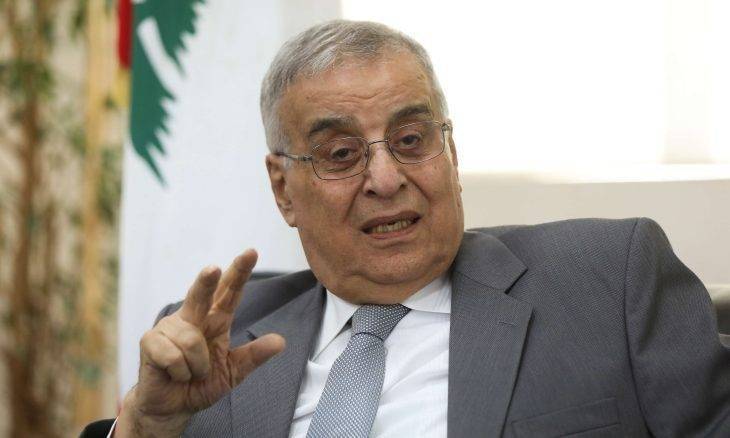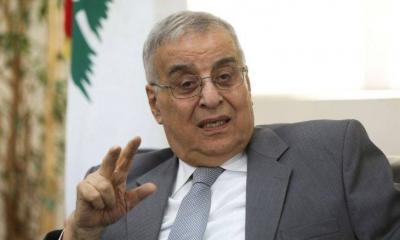Lebanon's Minister of Foreign Affairs and Emigrants, Abdullah Bou Habib, clarified that "the renewal of UNIFIL will be in the same form as last year unless negotiations in the South succeed in reaching an agreement that necessitates changes." Bou Habib, in a statement to MTV, urged the Security Council "to sponsor the negotiations in the South leading to an agreement to implement Resolution 1701, without undermining the role of the negotiators."
He emphasized that "Israel must accept the cessation of its aggression, and Lebanon is ready for indirect negotiations, and I met Amos Hochstein for this purpose."
In a speech at the Security Council session regarding the situation in the Middle East, including the Palestinian issue, he stated: "We meet again in the Security Council to discuss the explosive situation in the Middle East, following a kind invitation from the Russian Federation. The conflict has expanded, conditions have deteriorated, and the fireball has grown, after the international community has thus far failed to implement United Nations resolutions aimed at achieving a ceasefire in Gaza, an exchange of prisoners and hostages, and allowing for the entry of essential humanitarian aid into Gaza."
Over the past months, several warnings about the risk of war expanding into Lebanon have reached Lebanese officials. Bou Habib noted that "we have heard dozens of statements from senior Israeli officials threatening to burn Lebanon, destroy it, and return it to the Stone Age." He reiterated from this platform a warning against miscalculation and playing on the edge of the abyss, dragging the entire region into a major explosion. He also reiterated Lebanon's rejection of war and its diligent efforts through contacts and meetings to avoid falling into the traps of Israeli recklessness seeking to continue and expand the scope of the war.
He stressed that "if this war occurs, it will shake the entire Middle East, spreading beyond borders and leading to a new displacement crisis that Europe will not escape from, not only from Lebanon and Israel but also from neighboring countries, fleeing from missiles, drones, and military aircraft. It will result only in destruction, devastation, and misery for the entire region, meaning more emigration and homelessness."
Therefore, Lebanon—geographically small but large in its global presence, culture, and history—continues to adhere more than ever to international legitimacy and seeks refuge in its resolutions. For us, the United Nations remains the line of defense we cling to, the last refuge from the logic of occupation, brutality, and violence. We are in dire need today of the United Nations' role as a sanctuary for small, peace-loving countries, including my country, Lebanon.
He mentioned the comprehensive framework proposed in the Security Council session held on January 23 regarding establishing lasting calm along Lebanon's southern borders. He reiterated the call for a ceasefire to move towards the complete implementation of Security Council Resolution 1701, which has proven capable of establishing relative stability in southern Lebanon since the end of the July 2006 war until October 7, 2023.
The shortest path for the return of tens of thousands of displaced persons from both sides to their residences is not through threats of war or igniting another front, but through the comprehensive and complete implementation of Resolution 1701, alongside a basket of guarantees that enhances the chances of sustainable security and calm in southern Lebanon, as follows:
1. Facilitate the rapid and safe return of displaced individuals from border areas where they fled after October 7, 2023, and restore normal life in all border villages and towns.
2. A definitive halt to Israeli violations—land, sea, and air—against Lebanon's sovereignty and internationally recognized borders, which have surpassed 35,000 violations since 2006 to date.
3. Stop cyber attacks threatening the security and safety of Lebanese vital installation networks, devices, applications, and electronic data, particularly at Rafic Hariri International Airport, impacting public safety and their operations and movements.
4. Support the United Nations and friendly countries of the Lebanese government to enhance the deployment of the Lebanese Army south of the Litani River, providing what is necessary in terms of equipment and helping to increase its numbers, ensuring that there will be no arms without the approval of the Lebanese government, with no authority other than that of the Lebanese government, as stipulated by Resolution 1701.
5. Recognize the internationally recognized Lebanese borders outlined between Lebanon and Palestine in 1923, confirmed in the Lebanese-Israeli armistice agreement signed on the Greek island of Rhodes in 1949, under the supervision and sponsorship of the United Nations, through the completion of the agreement on the 13 disputed border points, thereby allowing Israel to withdraw from all Lebanese territories it still occupies to internationally recognized borders.
6. Uphold the UNIFIL peacekeeping forces operating in southern Lebanon, which have contributed since their establishment to maintaining calm and stability in the region. He emphasized the importance of their constructive role in preserving peace and security over decades of work, notwithstanding their significant sacrifices and challenges, especially in recent months. Accordingly, we applied last month for the renewal and extension of their mandate without amendments and look forward to working with all Security Council members to achieve this, given the importance and centrality of their role.
Bou Habib reiterated the call to end the war in Gaza and de-escalate in southern Lebanon, noting that Israel continues to refuse to cease fire on Lebanon’s southern borders, seeking to keep the front burning while expanding acts of aggression, including burning thousands of olive trees and polluting agricultural land with white phosphorus, making it unfit for agriculture for years, depriving southern Lebanese farmers of their primary source of livelihood, perhaps their only one.
He concluded with a call for peace, stating that "the burning front on Lebanon's southern borders is inflamed due to the situation and the ongoing war in Gaza. Palestine will remain the key to stability in the Middle East. Despite the tragedy we face today in Gaza, let us all work together to make this a historic opportunity for engineering a better future for the coming generations in all countries of the region."




